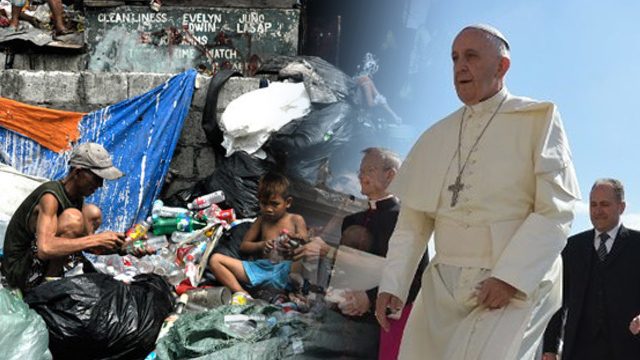SUMMARY
This is AI generated summarization, which may have errors. For context, always refer to the full article.

The visit of Pope Francis to the Philippines in January stirred so much excitement among Filipino environmentalists because it would set the stage for the release of his much-awaited encyclical on climate change. (READ: Pope cites Filipino bishops in historic encyclical)
But the recent release of the encyclical titled Laudato Si (Be Praised) would not likely inspire the same level of excitement among the Filipino people. The reason is that climate change is the least of the Filipino people’s concern.
It doesn’t mean, however, that Filipinos don’t care at all. They sporadically show their concern for the environment in such creative ways like concerts, fun runs, and fund-raising drives, and other campaigns that mobilize the people. Yet all these are exceptions rather than the rule. (READ: Filipino, French presidents make joint call for climate action)
At a youth leadership training I recently attended, where the theme revolves around the environment, a young speaker asked the audience what they believed to be the most urgent issue of our country. One high school student said it is drugs. Another said poverty. A third said corruption. Not contented with the responses, he prodded the audience until he heard what he was expecting to hear – the environment.
In October 2014, Pulse Asia asked Filipinos on the most urgent national concerns that must be addressed by the Aquino administration. The survey revealed that 50% of Filipinos believed that it is controlling inflation, followed by improving/increasing the pay of workers (49%), fighting graft and corruption in government (41%), creating more jobs (38%), reducing poverty (35%), fighting criminality (25%), enforcing the rule of law (15%), promoting peace (12%), controlling population growth (12%), and protecting the environment (12%). (READ: 5 in 10 Pinoys believe in end of gov’t corruption – poll)

Ted Nordhaus and Michael Shellenberger, in their book Break Through: Why We Can’t Leave Saving the Planet to Environmentalists, have observed a similar trend among the Americans. “When the pollsters asked voters to rank issues in terms of their importance,” Nordhaus and Shellenberger said, “the environment almost always came in last.”
To the Americans, Nordhaus and Shellenberger noted, the most important issue is not the environment. They cited a survey conducted by the Duke University’s Nicholas Institute for Environmental Policy Solutions, which revealed that the “the environment came in dead last (10% of voters), after economy/ jobs (34 %), health care (25%), Iraq (22%), Social Security (21%), education (20%), terrorism (20%), moral values (15%), and taxes (12%).”
Is climate change important to us?
So why do Filipinos remain unaffected, considering that the Philippines is the most vulnerable to the effects of climate change? Despite the vigorous efforts of environmentalists to push the climate change agenda, why does it hardly matter to most Filipinos?
What explains the disparity between what environmentalists think Filipinos’ most urgent concern should be and Filipinos’ actual concerns?
To understand why Filipinos care more about the rising prices of basic commodities than the environment, one needs to inquire into what motivates human beings. Here, Abraham Maslow’s theory lends a useful theoretical tool.
We are all familiar with Maslow’s theory of hierarchy of needs. It has been introduced to us way back when we were in high school. This theory holds that humans have put their needs in different levels.
At the bottom of this hierarchy are the physiological needs – food, shelter, clothing, etc. So basic are these material needs that humans would simply not survive without them. Directly above these needs are security needs, belonging needs, and esteem needs.
At the top of this hierarchy is the need for self-actualization. This last need helps in fulfilling one’s purpose and potential. These higher-order needs are referred to as post-material precisely because they only emerge when the needs lower than them are fulfilled.
What of the concern for the environment? Nordhaus and Shellenberger said: “Environmentalist values, such as strong desire to protect ecosystems, largely spring from higher-order, post-material, and inner-directed needs. And indeed, around the world there is a very strong association between prosperity and environmental values.”
That explains why Filipinos hardly care about their environment – because they have not sufficiently met their basic material needs yet, they don’t see the reason why there’s a need to protect the environment.
The annual average income of a Filipino family is around P235,000. The poorest Filipino family’s income is 10 times less than that of the richest. If one belongs to the poor sector, one tends to prioritize one’s basic material needs
Thus, one cannot expect the poor to be concerned about their carbon footprint when they’re unsure if they have food to eat. Neither will they care how their food is prepared – if it is fast food that leaves too much carbon footprint, or if it’s cooked using dirty energy like firewood and charcoal. – Rappler.com
Arvin Antonio Ortiz is a full-time teacher at the Basic Education Department of Holy Cross of Davao College, and a senior law student at the University of Mindanao College of Legal Education.
iSpeak is Rappler’s parking space for ideas worth sharing. Got an idea? Share it with us: move.ph+ipseak@rappler.com.
Add a comment
How does this make you feel?
There are no comments yet. Add your comment to start the conversation.